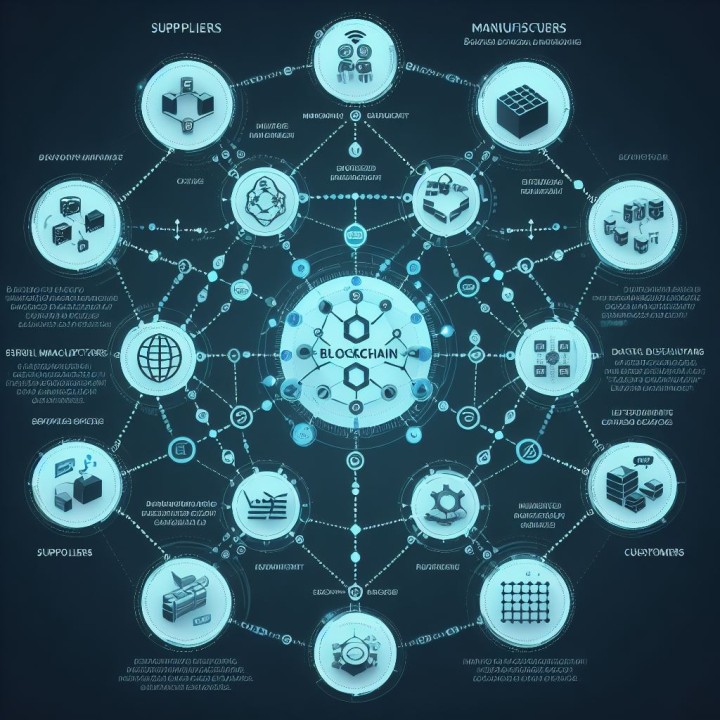
The Unveiling of Transparency: A Comprehensive Exploration of the Role of Blockchain in Parcel Tracking
Introduction:
In the realm of logistics and supply chain management, the quest for enhanced transparency, security, and traceability has led to the exploration of groundbreaking technologies. One such technology that has emerged as a potential game-changer is blockchain. While widely known for its association with cryptocurrencies, blockchain’s applications extend far beyond digital currencies. In this comprehensive exploration, we delve into the transformative role of blockchain in parcel tracking, shedding light on how this decentralized ledger technology is reshaping the way we monitor and manage the movement of packages across the globe.
Understanding Blockchain: A Foundation of Trust and Immutability
At its core, blockchain is a decentralized and distributed ledger that records transactions across a network of computers in a secure and transparent manner. The term “blockchain” derives from the structure of the technology, where data is grouped into blocks, and each block is linked to the previous one, forming a chain. This structure ensures the immutability of data, meaning once a block is added to the chain, it cannot be altered or tampered with.
Enhancing Security in Parcel Tracking: Immutable Records and Fraud Prevention
One of the primary challenges in traditional parcel tracking systems lies in the vulnerability of centralized databases to hacking and manipulation. Blockchain addresses this issue by providing an immutable and secure record of each transaction or movement within the supply chain. Each package’s journey is documented in a block, and the decentralized nature of blockchain ensures that altering the information in one block would require the consensus of the entire network, making fraudulent activities highly impractical.
Smart Contracts: Automating and Streamlining Operations
Smart contracts, self-executing contracts with the terms of the agreement directly written into code, play a pivotal role in leveraging blockchain for pgeonparcel tracking. In the logistics industry, smart contracts can automate various aspects of the supply chain, from confirming the dispatch of a package to triggering payment upon successful delivery. This automation not only reduces the risk of errors but also streamlines operations, leading to increased efficiency and cost-effectiveness.
Real-Time Visibility: Empowering Stakeholders with Timely Information
Blockchain’s real-time visibility capabilities revolutionize parcel tracking by providing all stakeholders with instantaneous access to the latest and most accurate information. Whether it’s the manufacturer, distributor, carrier, or end consumer, each participant in the supply chain can view the real-time status and location of a package. This transparency not only enhances communication but also allows for quicker decision-making and issue resolution, ultimately improving the overall efficiency of the supply chain.
Supply Chain Traceability: From Origin to Destination
Traceability is a critical aspect of supply chain management, particularly in industries where the provenance of goods is crucial, such as food and pharmaceuticals. Blockchain facilitates end-to-end traceability by recording every transaction or event related to a package, from its origin to its final destination. This capability is particularly valuable in cases of recalls or quality control issues, as stakeholders can quickly trace the source of a problem and take necessary actions to mitigate risks.
Decentralization and Resilience: Mitigating Risks in Parcel Tracking
Traditional centralized databases are susceptible to system failures, cyber-attacks, or natural disasters that can disrupt the entire supply chain. Blockchain’s decentralized nature mitigates these risks by distributing the data across a network of nodes. Even if one node fails or is compromised, the rest of the network continues to function, ensuring uninterrupted parcel tracking operations. This resilience is especially crucial in the context of global supply chains that span diverse geographical locations.
Cross-Border Transactions: Simplifying International Logistics
For global trade and cross-border transactions, the complexities of customs, tariffs, and varying regulations can create challenges in the supply chain. Blockchain simplifies international logistics by providing a transparent and standardized platform for recording and verifying transactions. This not only reduces the administrative burden but also facilitates smoother customs clearance, ultimately expediting the movement of packages across borders.
Collaboration and Trust: Strengthening Partnerships in the Supply Chain
The collaborative nature of blockchain fosters trust among participants in the supply chain. Each stakeholder has a shared, immutable record of the package’s journey, eliminating disputes and disputes over the veracity of information. This trust is particularly valuable in industries where multiple parties are involved in the supply chain, such as third-party logistics providers, manufacturers, and distributors.
Environmental Sustainability: Tracking Carbon Footprints
As sustainability becomes a focal point for many businesses, blockchain in parcel tracking can also play a role in tracking the carbon footprint of shipments. By recording the modes of transportation and the associated carbon emissions in a transparent and traceable manner, companies can take steps to optimize their logistics and reduce their environmental impact.
Challenges and Considerations: Scalability and Integration
While the potential benefits of blockchain in parcel tracking are significant, it is essential to acknowledge the challenges and considerations associated with its implementation. Scalability remains a concern as blockchain networks must handle a large number of transactions in real-time. Integration with existing systems and widespread adoption across the industry are also key hurdles that need to be addressed for blockchain to reach its full potential in transforming parcel tracking.
Conclusion:
As we navigate the evolving landscape of supply chain management, the role of blockchain in parcel tracking emerges as a transformative force. Its ability to provide unparalleled security, transparency, and automation has the potential to redefine how we monitor the movement of packages globally. While challenges exist, the ongoing exploration and adoption of blockchain technology in the logistics industry signal a promising future where trust, efficiency, and sustainability converge to create a seamless and resilient supply chain ecosystem. The transparency provided by blockchain not only ensures the integrity of parcel tracking but also sets the stage for a new era of innovation in the dynamic world of logistics.



